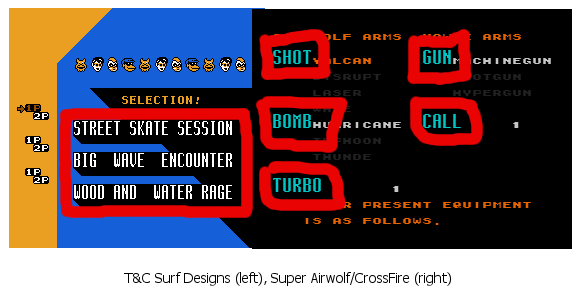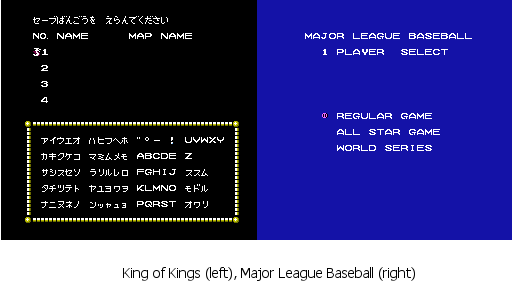Blog:6
Leave comments on the talk page (click "Discussion").
Contents
- 1 The LJN Mysteries: X-Men
- 2 LJN and...Atlus? UPDATE!
- 3 LJN and...Atlus?
- 4 GDRI on Twitter
- 5 Akashi Interview
- 6 New Interview Coming Soon
- 7 Bits and Pieces: Vintage
- 8 Bits and Pieces: You Can't Make This Stuff Up
- 9 Bits and Pieces: Bork, Bork, Bork!
- 10 Happy Valentine's Day! Here's Some Crap I Thought You Might Like...
The LJN Mysteries: X-Men
Ah, X-Men, the most mysterious of LJN's NES titles. Thanks to ArnoldRimmer83 at the Lost Levels forums for pointing out to me that Bothtec's Topple Zip for the Famicom Disk System shared sound effects with America's favorite comic book-based game (the music sounds similar, too, I might add). I'm pretty sure I've wanted to connect X-Men and Bothtec in the past. Perhaps I had subconsciously noticed a resemblance between Topple Zip and X-Men myself. Perhaps Dimitri and I had talked about it in the past on IRC.
I turned to Bothtec contractor Roman-Tech (which was involved with Topple Zip and whose website I stumbled on about a year ago) for answers...and was promptly shot down. President Yuki Ooura responded to my inquiry rather quickly, saying Roman-Tech did not develop X-Men.
Let's look at the MSX1 and MSX2 versions of Topple Zip, shall we? From the MSX1 version:
PROGRAMED BY KLON CREATED BY Trump Magic
From the MSX2 version:
GRAPHIC[[BY[[ROMAN TECH PROGRAM[[BY[[MICRO[VISION
Maybe one of these companies (well, not Roman-Tech) had something to do with X-Men.
Before I close this post, I should mention this cheat from the FDS version of Topple Zip. If you enter one of the following player names, you will be invincible:
「ロマンテク」("Roman-Tech")「アトミック」("Atomic")「セカイヘイ」("Sekaihei")「PIXEL」
Does "Pixel" refer to the developer? Were "Atomic" and "Sekaihei" companies?
LJN and...Atlus? UPDATE!
Ladies and gentlemen, definitive proof Atlus did games for LJN! Less than 24 hours after I wrote the previous post, I found this courtesy of the Japanese BCN (Business Computer News) Archive. It's a writeup on Atlus from the October 15, 1990 edition of BCN. There's a whole series of these old articles on "game softhouses" like Compile, Pony Canyon, and Artdink. Anyway, here's an appropriate excerpt as spewed out by an online translator:
In the second year, I continued software development by NAMCO, Hudson, the request from the famous maker such as Jaleco Ltd. Above all, the "goddess transmigration" (the release, NAMCO) of software for Nintendo attracted attention. It is a request of American LJN company more in this year, and it is NES( Nintendo / entertainment system - Nintendo and starts development of the software of) use. It was five "jaws (the thing which made movie jaws" a game) titles that the company dealt then and extended product line, and the number of employees suffered from 22 people from five people at the time of the establishment.
Interesting that Jaws is mentioned. I guess maybe Westone really was working under Atlus, and it wouldn't be the last time. It looks like Westone was also working under Atlus on the Hudson-published Power Eleven for the PC Engine (I've put the credits in the Credits Dump).
LJN and...Atlus?
LJN was an American toy company started in 1970 that was later sold to MCA and got into the video game business, then was acquired by Acclaim. The mere mention of its name strikes fear into the hearts of many. However, you can't give LJN all the blame for its games of, shall we say, inconsistent quality because nothing was developed in-house.
The companies responsible for all the Western-developed games have been figured out or were disclosed in the game. The mystery lies with the earlier NES titles, specifically ones that were clearly developed in Japan.
- We know Westone (the Wonder Boy folks) did Jaws because it's listed on the official Westone website.
- According to freelance composer Hirohiko Takayama's own website, he worked on Gotcha! The Sport!, Friday the 13th, The Karate Kid, and NFL.
- Friday the 13th shares little aesthetic resemblance with any other game. I don't think it was developed by Atlus, despite involvement from Takayama.
- Same goes for X-Men, except no Takayama involvement. It definitely looks and sounds like a Japanese game, though, but it's otherwise a complete mystery.
- Shouichi Yoshikawa seemed pretty confident that graphic artist/designer Junzou Shimada worked on T&C Surf Designs and Gotcha! at Sanritsu. I'm not so sure, but there is evidence to suggest Yoshikawa was right: T&C Surf Designs (a 1988 release) and Super Airwolf/CrossFire for the Mega Drive/Genesis (a 1991 release) share a similar font. Super Airwolf/CrossFire was developed by A.I, a company started by former Sanritsu employees who would have probably still been there when T&C was being made. I'm going to assume Shimada had nothing to do with A.I or Super Airwolf/CrossFire (he would eventually start his own company).
- Famicom strategy game King of Kings (developed by Atlus for Namco) and Major League Baseball share a similar font.
- Too bad I can't read Japanese and only have an online translator at my disposal. Erika to Satoru no Yume Bouken (another FC game developed by Atlus for Namco) has a hidden message left by a disgruntled staffer named "Hidemushi." It was "uncovered" on 2ch years later, where it was also transcribed. I can't make much sense of it, of course. There's something about sex in there. This post mentions something about a programmer who worked on the bonus stages on Karate Kid. Maybe it's someone talked about in the message?
- During the message, you hear two music tracks play, the first of which is from Karate Kid. Neither use the N106 chip, unlike the other in-game tracks.
Now let's put this all together in a nice little hypothetical scenario. I have a feeling these Japanese-developed games were all contracted to Atlus or another company in Japan which then subcontracted them to Atlus. Atlus then turned around and subcontracted or sub-subcontracted some of them to other companies. This might explain why Takayama still worked on Gotcha!, for example (because he would have still been working under contract with Atlus). Perhaps this also explains why A.I, started by former Sanritsu staff as I mentioned before, had a relationship with Atlus later on. The fact that Atlus and Westone were started by one-time Tehkan (Tecmo) employees might explain a relationship between those two companies.
Here's that scenario in handy chart form:
LJN -----> Possible middleman? -----> Atlus -----> Takayama (sound for NFL, etc.)
|
| -----> Westone (Jaws)
|
| -----> Sanritsu (Gotcha!, T&C)
|
| -----> ??? (Friday the 13th)
|
| -----> ??? (X-Men)
GDRI on Twitter
GDRI has jumped on the Twitter bandwagon! Why? Hell if I know, but now I can say, "Hey, GDRI's on Twitter!" I haven't posted much of anything on there, but this might actually help me keep track of some of my findings.
I am also on the Japanese social networking site Mixi. Thanks to Bock of SMS Power for getting me in. It's allowed me to get in touch with a few Japanese developers.
Akashi Interview
The first part of our interview with Beyond Interactive CEO Hitoshi Akashi is up! In addition to everything else we talked about, he reveals some little-known history about Human, the original publisher behind the Fire Pro Wrestling and Clock Tower series. Turns out Human used to be called Sonata, which in turn was the result of a merger between two other companies. More answers will be coming in April.
In light of this new information about Human, I noticed the sign you see to your right on a couple of tracks in the Konami-published Motocross Champion for the Famicom (which we had already confirmed as Human-developed via code comparisons and shared credits). Could "SNT" mean "SONATA?"
EDIT: Image added. Sorry for the delay.
New Interview Coming Soon
GDRI has made contact with Hitoshi Akashi, CEO of developer Beyond Interactive. Before starting Beyond in 1989, he worked for Zap and Sonata, the company that later became Human (yes, that Human). During the 1990s, he served as manager of Electronic Arts Victor's Japanese development studio and later Vice President of EAV. Stay tuned!
Bits and Pieces: Vintage
- Great in-depth interview with Jerry Lawson, creator of the Fairchild Channel F system
- Game-related scans of the 1991 Sears Christmas catalog
- Victor Ireland's Gaijinworks finally announced something
- Cancelled Treasure-developed Tiny Toons game for the PS2 leaked
- Create text in old arcade fonts
- Digital Press presents 10 Atari 2600 games worse than E.T. (1 2 3)
Bits and Pieces: You Can't Make This Stuff Up
- A Brazilian man armed with an SMS Light Phaser takes hostages
- Shamone! Michael Jackson is getting rid of his video game collection. Dig that R-360!
- One man's journey to dump an unreleased MD/Gen fighting game
- Speaking of the R-360:
- The Sega R-360 Preservation Project
- {{#ev:youtube|meYx9RuCAQY}}
Bits and Pieces: Bork, Bork, Bork!
- View from a Swedish Sega distributor
- GameSetWatch interview with Natsume composer Hiroyuki Iwatsuki
- Todd Ciolek/GameSetWatch interview with Atari closeout king O’Shea president Bill Houlehan
- I've added some Psycho World character design sketches (or whatever you want to call them) to the Tsunetomo Sugawara interview.
Happy Valentine's Day! Here's Some Crap I Thought You Might Like...
Because I've become tired of waiting for certain people to translate/look over translations, I've decided to post what we have of our interviews with Mikito Ichikawa and Hertz's Tsunetomo Sugawara. Since these are translations from Japanese, they are subject to fixes/rewrites as needed. Stay tuned - there's more to come with both interviews.
So as to maintain what little sanity I have left, I've also decided to not post the original Japanese alongside the English translations. The original Japanese is available upon request, should someone want it, and if in the distant future there's a Japanese version of GDRI, it will probably turn up there.
(and no, the interviews mentioned above are not "crap")


